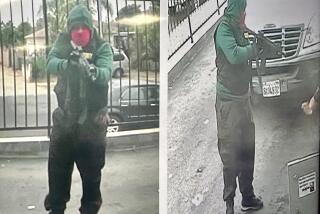Longtime Fugitive Pleads Guilty in Bank Heist
- Share via
A Los Angeles bank robbery suspect who surrendered to the FBI after 17 years as a fugitive has agreed to plead guilty to a conspiracy charge, the U.S. attorney’s office said Friday.
Derrick Alan Stevens, who had established a new life for himself as a respected, churchgoing food services executive on the East Coast, is scheduled to enter his plea Monday before U.S. District Judge Harry L. Hupp.
Stevens has been held without bail since his surrender in November.
The conspiracy charge carries a maximum penalty of five years in prison, but Stevens’ lawyer said Friday that he will ask for leniency, given evidence of his client’s self-rehabilitation.
“We hope the court will understand and appreciate what Derrick Stevens has accomplished these past 17 years,” said defense attorney Richard M. Steingard.
Assistant U.S. Atty. Gregory W. Jessner said the prosecution will wait for the results of a pre-sentencing report by the federal probation office before taking a position on how much time Stevens should serve.
On Oct. 28, 1983, Stevens was the getaway driver in a $228,000 holdup by three armed men of a Family Savings and Loan Assn. branch on Crenshaw Boulevard. One of the robbers wore a Richard Nixon mask.
A few hours earlier, authorities said, one or two of the bandits hijacked a van in Los Angeles’ wholesale vegetable market, shooting the driver to death and burying his body in a pile of garbage. The van was used in the robbery.
Steingard said Friday that Stevens had nothing to do with the killing. His plea agreement makes no mention of the slaying, and the prosecution said it is not alleging that he was involved.
The three other suspects in the robbery were arrested and ultimately convicted, but Stevens escaped and vanished without a trace.
Going by the name of Derrick Anderson, he was hired in the late 1980s by Atlanta-based Gourmet Services Inc. Smart, and he rose rapidly in the company, heading cafeteria operations at Clark Atlanta University in Georgia and Hampton University in Hampton, Va., before taking over food service operations at the University of Maryland, Eastern Shore.
Stevens earned a good salary, saved his money and bought a home overlooking a lake. He catered parties in his spare time, including some for high-ranking officers of the Maryland State Police.
The FBI never gave up on its search for Stevens. In 1999, it sent his wanted poster to 56,000 post offices and police departments around the country. One of those posters caught the attention of a university student who recognized Stevens and notified authorities in Princess Anne, Md.
Confronted by police at the campus cafeteria, Stevens managed to give them the slip. Fleeing Maryland, he moved from place to place for more than a year. During that time, the FBI kept up the pressure, telling his friends and relatives that it was “just a matter of time.”
Last November, Mary Hogan, the FBI agent assigned to track Stevens, got a phone call from a friend of the fugitive who said Stevens was ready to give himself up. Hogan was waiting for Stevens when he arrived outside the FBI’s field headquarters in Westwood. She shook his hand before placing him in handcuffs.
Stevens’ accomplices--Gregory Lewis, then 28, Augustus Evans, then 19, and Kevin Jackson, then 25--served time for the robbery. Lewis was also convicted under a federal statute in the slaying, but that conviction was later overturned because of a judicial error.
More to Read
Sign up for Essential California
The most important California stories and recommendations in your inbox every morning.
You may occasionally receive promotional content from the Los Angeles Times.













